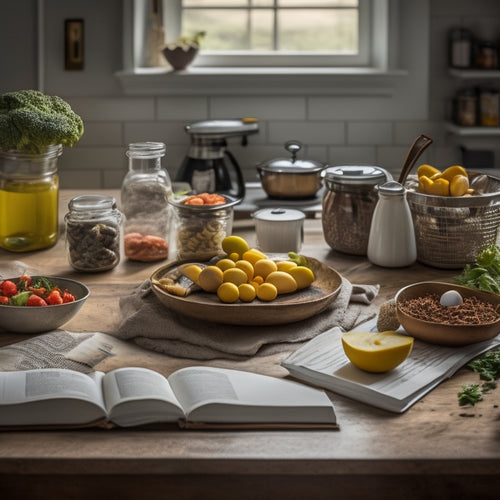
What's Holding You Back From Affordable Meal Planning?
Share
You're likely struggling to plan affordable meals because you're letting unrealistic expectations hold you back. You think you need to be a perfect meal planner, but that's just not realistic. You might lack meal planning skills, feeling overwhelmed by planning meals for the week. Or, you might have inefficient grocery shopping habits, like impulse buying, which can blow your budget. Perhaps your kitchen space is unorganized, making meal prep a nightmare. Or, you might be limited by your cooking knowledge, relying on expensive takeout. But, by addressing these common obstacles, you can finally break free and discover a path to affordable meal planning that actually works for you.
Key Takeaways
• Unrealistic expectations of perfection and fear of failure often hold people back from starting an affordable meal planning routine.
• Lack of meal planning skills and experience can lead to feelings of overwhelm and discouragement.
• Inefficient grocery shopping habits, such as impulse buying and lack of planning, can derail meal planning efforts and blow the budget.
• A cluttered and disorganized kitchen can make meal planning and cooking more difficult and time-consuming.
• Limited cooking knowledge and reliance on expensive takeout or dining out can make it hard to stick to an affordable meal plan.
Unrealistic Expectations of Perfection
You've likely set yourself up for disappointment by believing that meal planning must be a flawless, Instagram-worthy process, with every ingredient perfectly chopped and every meal carefully calibrated to meet your dietary needs. This unrealistic expectation is often fueled by social pressure and the curated highlight reels of others' seemingly perfect meal planning routines. But the truth is, nobody is perfect, and the pursuit of perfection can be paralyzing.
You've bought into the idea that your meal planning skills are inadequate because they don't meet your lofty personal standards. Newsflash: nobody starts out as a meal planning pro. It's a skill that develops over time with practice and patience. By letting go of the need for perfection, you can focus on making progress, not achieving an unattainable ideal.
Lack of Meal Planning Skills
Mastering meal planning skills takes time and practice, and it's important to acknowledge that a lack of experience is a common obstacle for many individuals. You might feel overwhelmed by the thought of planning meals for the week, and this meal planning anxiety can hold you back from taking the first step.
However, the truth is that meal planning is a skill that can be developed with time and effort. By starting small and setting realistic goals, you can build your confidence in the kitchen and eventually create a meal planning routine that works for you.
One of the most significant benefits of developing meal planning skills is the cooking confidence boost you'll experience. When you have a plan in place, you'll feel more in control of your kitchen and more confident in your ability to prepare healthy, delicious meals. This confidence will translate to other areas of your life, and you'll find that you're more empowered to make healthy choices and take care of yourself.
Inefficient Grocery Shopping Habits
Three out of four people admit to buying groceries on impulse, which can lead to a cluttered pantry, wasted food, and a blown budget, highlighting the need to revamp your grocery shopping habits to achieve affordable meal planning.
You're not alone in this struggle! Here are three common inefficient grocery shopping habits that might be holding you back:
-
Impulse buys: Those tempting displays at the checkout line or the 'buy one get one free' deals can be hard to resist. But, they often lead to unnecessary purchases that derail your meal planning efforts.
-
Store layouts: Have you ever noticed how stores strategically place high-profit items at eye level or near the entrance? It's a clever tactic to get you to spend more. Be aware of these layouts and stick to your shopping list!
-
Lack of planning: Going to the store without a clear plan or shopping list can lead to aimless wandering and, you guessed it, impulse buys.
Unorganized Kitchen Space
Cluttered countertops and disorganized cupboards can sabotage your affordable meal planning efforts, making it difficult to find ingredients, prepare meals, and stay on track. You're not alone if you're struggling with kitchen clutter. In fact, it's a common obstacle that can lead to food waste, increased stress, and a blown budget.
To overcome this hurdle, you need effective storage strategies. Start by decluttering your kitchen, getting rid of items you no longer need or use. Next, assign a home for each item, ensuring everything has a designated place. Invest in storage solutions like baskets, bins, and shelves to keep items off the countertops and out of sight. Label each storage container so you can easily find what you need.
Limited Cooking Knowledge
With a well-organized kitchen in place, you're now ready to tackle another significant obstacle to affordable meal planning: your limited cooking knowledge, which can make meal prep feel overwhelming and lead to a reliance on expensive takeout or dining out.
Don't let cooking fears hold you back! Here are three simple ways to overcome your limited cooking knowledge:
-
Start with simple recipes: Look for recipes with fewer ingredients and steps, and practice until you feel confident.
-
Watch cooking tutorials: Online videos and cooking shows can help you learn new skills and build your confidence in the kitchen.
-
Experiment with new ingredients: Try new herbs, spices, and vegetables to add variety to your meals and expand your cooking repertoire.
Meal Planning for Picky Eaters
When it comes to meal planning, you're likely no stranger to dealing with picky eaters - whether it's a finicky child or a partner with specific tastes. You know that pleasing everyone's palate can be a challenge, and it's frustrating when your best efforts are met with resistance.
In this section, you'll learn practical strategies for accommodating different tastes and preferences without breaking the bank.
Dealing With Fussy Kids
You're likely no stranger to the daily struggle of getting your kids to eat a balanced meal, especially when they're stuck on a particular food or refuse to try anything new. It's frustrating, but don't worry, you're not alone. Many parents face this challenge, and there are ways to overcome it.
Here are three strategies to help you deal with fussy kids:
-
Offer kid-friendly alternatives: Serve veggies and fruits in fun shapes or as dips, making healthy food more appealing to their taste buds.
-
Sneak in nutrition: Add finely chopped veggies like spinach or carrots to pasta sauce, meatloaf, or muffins. They'll get the nutrients without even realizing it!
-
Make mealtime interactive: Let them help with meal planning and grocery shopping. This can spark their interest in trying new foods and taking ownership of their meals.
Pleasing Everyone's Palate
Meal planning for picky eaters requires a delicate balance of taking into account individual tastes while avoiding the culinary equivalent of a tantrum at the dinner table. You've got to take into consideration the likes, dislikes, and dietary restrictions of each family member. Are there food allergies you need to navigate? Do cultural preferences play a role in your meal planning?
It can be overwhelming, but don't let it hold you back from achieving affordable meal planning. Start by identifying common ground. What meals do everyone enjoy? Make those staples in your meal planning. Then, accommodate individual tastes by offering variations or substitutions. For example, if one child hates vegetables, offer a side of fruit instead.
Be open to trying new recipes and flavors to keep mealtime interesting. You can also involve your family members in the meal planning process, letting them take turns choosing a meal or helping with grocery shopping. By finding this balance, you'll reduce food waste, save time, and enjoy stress-free mealtimes. Remember, it's about finding a compromise that works for everyone, not about being a short-order cook.
No Time for Meal Prep
Busy schedules can turn cooking into a challenging task, leaving you scrambling for quick fixes that often sacrifice nutrition for convenience. You're not alone in this struggle. When your days are filled to the brim, it's easy to let meal prep fall by the wayside.
Here are three common obstacles that might be standing in your way:
-
Rushed morning routines: You're already running late, and the last thing on your mind is preparing a healthy meal.
-
Unpredictable schedules: Your day is filled with unexpected tasks, making it difficult to plan and prep meals in advance.
-
Limited time for cooking: You're exhausted after a long day and don't have the energy to spend hours in the kitchen.
But what if you could find a way to overcome these obstacles and still enjoy healthy, affordable meals? It's possible. By implementing a few simple strategies, you can take control of your meal planning and prep, even with a busy schedule.
Stay tuned for practical tips and solutions to help you break free from the cycle of quick fixes and convenience foods.
Budgeting for Groceries Effectively
Creating a realistic grocery budget starts with tracking your monthly food expenditures to identify areas where you can cut back without sacrificing nutrition. You'll be surprised at how much you can save by making a few adjustments. Start by reviewing your receipts and identifying patterns in your spending. Are you buying too many convenience foods or dining out too frequently? Once you have a clear picture of your spending habits, you can set a realistic budget that works for you.
Next, take advantage of grocery sales and plan your meals around the items that are on sale. You can also use cashback apps like Ibotta and Fetch Rewards to earn money back on your grocery purchases. By combining these strategies, you can save even more.
Another tip is to buy in bulk and plan your meals around staples like rice, beans, and pasta. With a little creativity and planning, you can create delicious, healthy meals without breaking the bank. By budgeting effectively, you'll be able to enjoy the freedom and flexibility that comes with knowing exactly how much you're spending on groceries each month.
Frequently Asked Questions
Can I Meal Plan if I Have Dietary Restrictions or Allergies?
"Fasten your seatbelt, ancient Greek philosopher Epicurus would agree, meal planning with dietary restrictions is a breeze! You can totally rock gluten-free options and allergy-friendly swaps, liberating your taste buds and wallet from culinary constraints."
How Do I Avoid Food Waste With Meal Planning?
You avoid food waste by shop smart, buying only what you need, and utilizing fresh storage techniques like refrigerating leftovers and freezing meal prep to keep your groceries fresh and ready to use.
Can Meal Planning Accommodate My Busy Social Schedule?
You accommodate your busy social schedule by prioritizing social commitments, then allocate time for meal planning and prep using time blocking, ensuring you make space for social priorities without sacrificing healthy, affordable meals.
Is Meal Planning Only for Large Families or Singles Too?
You don't need a big family or massive kitchen to meal plan; solo lifestyles and small kitchens can thrive with intentional planning, allowing you to maximize space and resources while saving time and money.
Do I Need Special Equipment or Tools for Meal Planning?
You're not shackled to fancy gadgets, but having Kitchen Essentials like a slow cooker and Meal Prepware can be a liberating game-changer, freeing you to focus on what matters: nourishing your body and soul.
Related Posts
-

Healthy Breakfast Snacks for Mornings on the Run
We know that when you are on the run it is difficult to cook breakfast and even worse to eat healthy! That’s why we f...
-

Why Renters Need Creative Kitchen Storage Solutions
You're likely no stranger to the frustrating reality of limited kitchen storage, where every inch counts and clutter ...
-

Why Keto Dieters Need a Meal Planning System
You need a meal planning system to supercharge your keto diet because without one, you'll be stuck in a vicious cycle...


